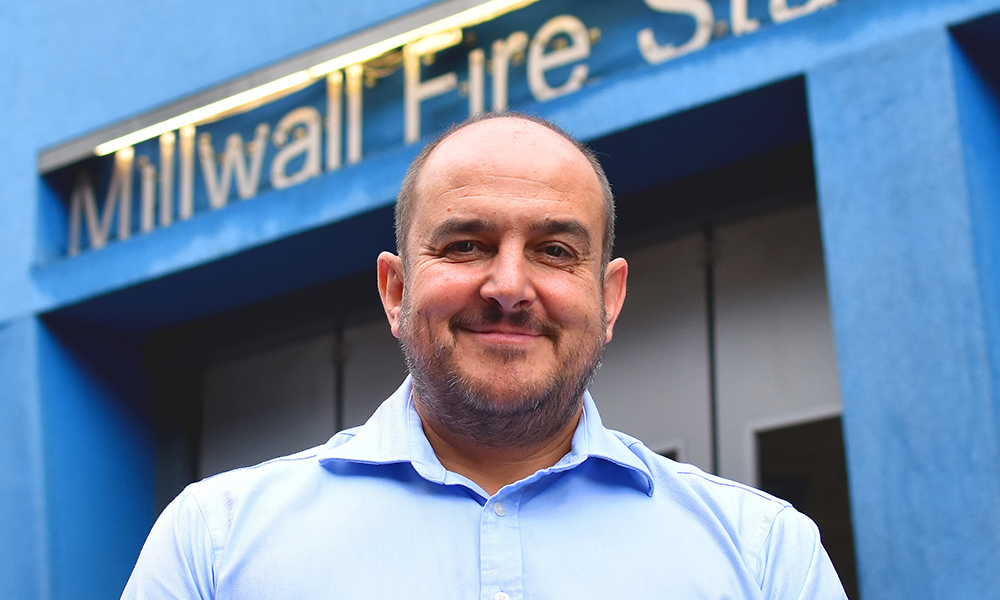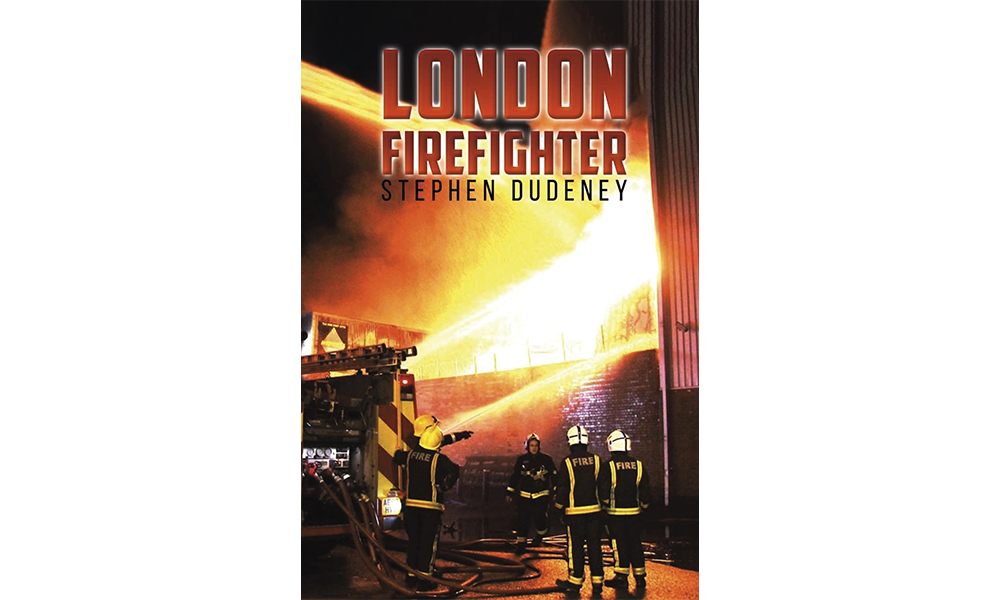Book by former borough commander for Tower Hamlets and Hackney is available now

Subscribe to Wharf Life’s weekly newsletter here
There’s a circle to this story – it begins and ends with the printed word.
Stephen Dudeney grew up in Poplar, just down the road from its fire station.
As a boy in the 1970s, he was fascinated with the fire engines, even chasing them on his bike when he was old enough to ride.
“I loved them,” he said. “When I was about 12 I started going to the big library in Mile End to look at picture books full of them.
“Then, one day, I saw a book with a really bright cover – loads of flames and fire engines. I pulled it off the shelf, and it was just full of text.
“I was disappointed, but I started reading it and found I quite liked it.”
It was an encounter that fed what was already a growing passion and Gordon Honeycombe’s Red Watch about firefighers in Paddingtonand Denis Smith’s Report From Engine Co. 82 about a fire crew in New York added further fuel to the flames.
Stephen said: “Gordon, who was then an ITN newsreader, had done a lot of charity work with the London Fire Brigade, and his book was a best-seller.
“It’s known as the book that launched a thousand careers because a lot of people – a bit older than me – had read it and decided to join.”
While Stephen had always been fascinated by fires, once harassing his dad to take him to see a big blaze in Wapping, his journey to becoming a firefighter really began aged 14 when he and a friend volunteered to help out at Poplar fire station.
“We turned up on bonfire night because we knew it would be busy and offered to make the tea and cook some dinner for them,” he said.
“We both expected them to tell us to go away. I remember them saying ‘Thank you very much’ and we were expecting a ‘but’.
“Instead, they said: ‘We’d love you to. Come on Thursday night, about six’. So we did.
“It was a different time, that’s not something that could happen now – just imagine, an unaccompanied 14-year-old at the station.
“Looking back, I expect they thought I was a poor kid, which I wasn’t really.
“I don’t think they thought I’d end up as a firefighter – I probably didn’t seem intelligent to them.
“But I’d join in with all the banter and I used to go down the pub with them – fancy being given a pint at that age.
“It was a good time. It changed me at school too – I started using that banter at school and the other kids probably thought I was a bit of a live wire.
“I was probably fairly bright and had been doing well with my studies but I know I was a bit of a disappointment to my parents because, having been put in the advanced classes with good reports, at that time I decided I didn’t need to worry about all that because I was going to be a fireman.”
Stephen joined the brigade in 1987, with his first shift the day after the King’s Cross fire that claimed the lives of 31 people.
His 31-year career saw him serve at all the fire stations in Tower Hamlets, rising first to training officer and then station officer before going on to become station commander and then borough commander for Hackney in 2013.
Then, as Tower Hamlets had been placed in special measures, he returned to the area where it all began for him, finishing his career as borough commander in 2018, based at the new Millwall Fire Station on the Isle Of Dogs.

While that completed the circle career-wise for Stephen, he’s since gone one step further, publishing London Firefighter, a book that aims to give readers a sense of the evolution of the London Fire Brigade during his more than three decades of service.
“The changes have been massive over that time,” he said. “When I joined, it was still very much the fire brigade of the post-war era.
“The big changes came through the 1990s and into the 2000s, and it’s now completely unrecognisable.
“We used to do a lot more of a lot less – it was fires, car crashes and the occasional flood.
“When you look at what’s done now – all sorts of things such as water rescue and animal rescue – the firefighters have got equipment and procedures that are so different.
“If I’d joined in 1957 and left in 1987, I would have recognised everything.
“Leaving in 2018, the only thing that was the same, was the water and the hoses. I hope this book shines a light on the modern brigade and how firefighting is a bit of London history.
“I want people to come away thinking we’re not a bad bunch.
“I’d always had the idea that I wanted to write a book and I’d kept notes over the years – moving files over from computer to computer.
“Then, when I retired, I thought I would do something about it.”
While the book offers vivid first-hand accounts of what it was like for Stephen to tackle ferocious fires up close, it also offers a wider perspective on the sheer complexity of organising the service and its multitude of functions.
For example, during his career Stephen played his part in the response to such major incidents as the 1996 Docklands bombing by the IRA at South Quay on the Isle Of Dogs and the Buncefield fire – the biggest incident of its kind in peacetime Europe – when an oil storage facility exploded in 2005.
“You expect to see and experience some things as a firefighter,” he said.
“I was called out to Grenfell Tower and it remains the worst thing I’ve ever seen.
“From a mental health point of view, I’ve largely survived the fire brigade in terms of the awful things that I saw over the years, but Grenfell really affected me.
“Since I left the service, I’ve started a company that consults and advises on fire safety and I was recently on my way to do a survey of a building when I passed the tower.
“I thought I was OK, seeing it again, but later on I couldn’t get it off my mind.
“Even though I wasn’t there over the night, when it was at its worst, it’s had a tangible effect on me and I think there will be a generation of firefighters who will feel the same, who will never forget it.”
That’s also the point of Stephen’s book.
To set down what happened and who it happened to, so those events and people aren’t forgotten.
- London Firefighter by Stephen Dudeney is published by Austin Macauley Publishers and is available from Amazon priced £11.99.
Read more: New Scientist Live returns to Excel with a festival of ideas and innovations
Read Wharf Life’s e-edition here
Subscribe to Wharf Life’s weekly newsletter here
- Jon Massey is co-founder and editorial director of Wharf Life and writes about a wide range of subjects in Canary Wharf, Docklands and east London - contact via jon.massey@wharf-life.com



